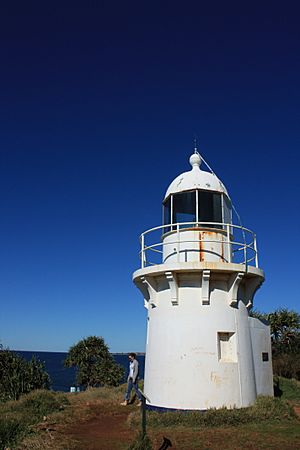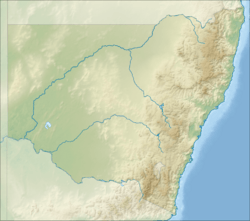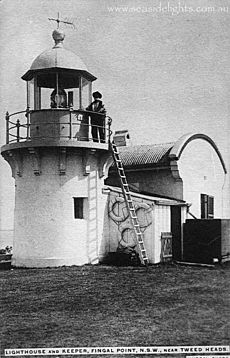Fingal Head Light facts for kids
 |
|
| Fingal Head Light, 2009 | |
|
|
|
| Location | Fingal Head New South Wales Australia |
|---|---|
| Coordinates | 28°12′0.07″S 153°34′14.98″E / 28.2000194°S 153.5708278°E |
| Year first constructed | 1872 (post light) |
| Year first lit | 1878 |
| Automated | 1920 |
| Foundation | concrete slab |
| Construction | sandstone masonry tower |
| Tower shape | cylindrical tower with balcony and lantern |
| Markings / pattern | white tower and lantern |
| Height | 23 feet (7.0 m) |
| Focal height | 80 feet (24 m) |
| Current lens | fourth order catadioptric |
| Intensity | white: 37,000 cd red: 9,000 cd |
| Range | white: 17 nautical miles (31 km; 20 mi) red: 14 nautical miles (26 km; 16 mi) |
| Characteristic | Fl WR 5s. |
| Admiralty number | K2844 |
| NGA number | 111-5872 |
| ARLHS number | AUS-073 |
The Fingal Head Light is a working lighthouse found at Fingal Head in New South Wales, Australia. It sits on a piece of land that sticks out into the sea, called a headland. This spot is about 5 kilometers (3 miles) south of Point Danger, which is where the border between New South Wales and Queensland is.
Contents
History of the Fingal Head Light
The first light station here was set up on February 19, 1872. It was a simple wooden pole, about 9 meters (30 feet) tall. This pole held a kerosene lamp that shone a steady white light. The light was not very bright, only about 1,000 cd (a measure of light intensity).
The daughter of William Arnold, the first lighthouse keeper, described it. She said it looked like a large "meat safe" on a wooden structure, like a pigeon loft. The keeper had to row a boat from the Tweed Heads Pilot Station every day. He would light the lamp at sunset. A small hut was built for him to stay in.
In October 1878, the Maritime Board of New South Wales decided to build a more modern lighthouse. This new lighthouse was one of five similar designs created by James Barnet between 1878 and 1880. The other lighthouses were Richmond River Light, Clarence River Light (which is no longer standing), Tacking Point Lighthouse, and Crowdy Head Light.
The new lighthouse originally had a small porch and an extra room for storing oil. A four-room house for the lighthouse keeper was also built. It was about 20 meters (65 feet) northwest of the tower. Joseph William Mortley and Shepherd built both the lighthouse and the keeper's house.
On June 15, 1920, the light was changed to an automatic carbide lamp. This lamp used acetylene gas and was much brighter, at 1,500 candela. It also changed from a steady light to a group flashing light. Soon after this, the lighthouse no longer needed a keeper. All the other buildings, except the tower, were taken down.
In 1980, the light was updated again to use electricity. Today, it uses a modern FA-251 Beacon with a 12-volt, 75-watt quartz halogen lamp. It runs on mains electricity and has a battery backup in case the power goes out. The light rotates once every 30 seconds.
The light's current pattern is a flash every five seconds. It shines red towards the east and white in all other directions.
How the Lighthouse is Built
The Fingal Head Light is a round tower made from bricks. The outside is covered with a smooth cement finish. At about 3.6 meters (12 feet) above the ground, there's a platform made of bluestone. This platform sticks out and is held up by shaped bluestone supports called corbels.
A metal handrail surrounds the platform. On top of the platform is the domed lantern room. This is where the special glass lens, called a fourth order catadioptric lens, is located. This type of lens helps to focus and direct the light.
Who Manages the Lighthouse
The light itself is operated by Roads and Maritime Services. This group used to be called NSW Maritime. The land and site where the lighthouse stands are managed by the New South Wales Department of Lands.
Visiting Fingal Head Light
You can reach the Fingal Head Light by road. Just drive south from the Pacific Highway, near the Tweed River. There is a parking area available for visitors.
Close to the lighthouse, you'll find a public beach and a picnic area. These are great spots to relax and enjoy the view. However, the lighthouse tower itself is not open for people to go inside.



